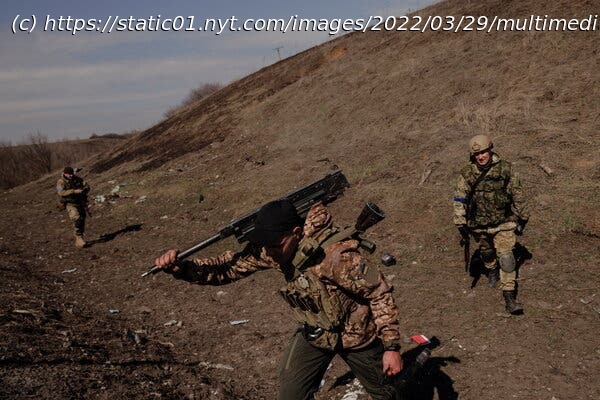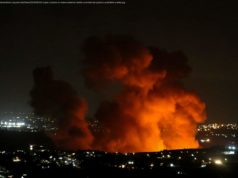Kyiv March 29, 9:15 p.m.
Moscow March 29, 9:15 p.m.
Washington March 29, 2:15 p.m.
The gains in negotiations …
Kyiv March 29, 9:15 p.m. Moscow March 29, 9:15 p.m. Washington March 29, 2:15 p.m. The gains in negotiations came as Ukrainian troops appeared to push back Russian forces around Kyiv. Russia said a meeting between President Vladimir V. Putin and President Volodymyr Zelensky could occur once a draft peace agreement was ready. Anton Troianovski, Megan Specia and Ivan Nechepurenko The first sign of progress emerged in peace talks between Ukraine and Russia on Tuesday as a deputy Russian defense minister said Russia would sharply “reduce military activity” near Kyiv, Ukraine’s capital, and the northern city of Chernihiv. Russia also said it was ready to set a meeting between President Vladimir V. Putin and President Volodymyr Zelensky of Ukraine once a draft peace agreement between Ukraine and Russia was ready. Speaking after the talks, held in Istanbul, Ukrainian officials outlined for the first time potential concessions over territory that Ukraine is all but certain to have lost to Russia. They proposed a 15-year process of negotiations about the status of Crimea, the Ukrainian peninsula seized and annexed by Russia in 2014. And they said control of the eastern Ukrainian region known as the Donbas, which Russia no longer recognizes as part of Ukraine, could be discussed in talks between the two leaders. The next step would be for the foreign ministers of Russia and Ukraine to meet to “give the latest shape to the common understanding” reached on Tuesday, Turkey’s foreign minister, Mevlut Cavusoglu, said in televised remarks. “This war that caused thousands of people to die and millions of others to be displaced should stop,” he said. Here are some other major developments: Even as the talks took place, Russian military strikes and Ukrainian counter offensives continued across the country on Tuesday. The U.S. secretary of state, Antony J. Blinken, cast doubt on Russia’s pledges at the Istanbul talks. “There is what Russia says and there’s what Russia does,” he said, during a diplomatic trip to Morocco, adding, “And what Russia is doing is the continued brutalization of Ukraine and its people and that continues as we speak.” In an overnight speech, Mr. Zelensky said that while Irpin, a Kyiv suburb, had been “liberated” and Russian forces had been “pushed away from Kyiv,” the battle for the city was far from over. “It is too early to talk about security in this part of our region,” he said. A Russian missile struck an oil depot in the northwestern Rivne region on Monday night, and on Tuesday morning a Russian attack destroyed much of a regional government building in the southern port city of Mykolaiv, leaving at least 11 people trapped in the ruins, according to the governor, Vitaly Kim. The head of the International Atomic Energy Agency arrived in Ukraine on Tuesday for talks with government officials over the safety of the country’s nuclear facilities, which have been targets for Russian forces. Oil prices dropped and stock prices jumped as cease-fire talks between Russia and Ukraine showed signs of progress. Dan Bilefsky and Andrew E. Kramer After Russia’s invasion, Kyiv became a battleground for the soul of Ukraine. Only five weeks ago one of Europe’s most lively capitals, it has become a place where residential apartment buildings can crumble under strikes at a moment’s notice, where street-by-street gunfights have raged in northwestern suburbs and where women are forced to give birth in underground makeshift shelters. Now, comments by Russia’s deputy defense minister on Tuesday that Russia would sharply “reduce military activity” near Kyiv amid fragile peace talks in Istanbul, have led to very cautious optimism that President Vladimir V. Putin may have deviated from his initial aim of seizing the capital. The comments followed recent indications from the Russian military that it wants to focus its military energies on consolidating gains in eastern Ukraine. Russia’s initial attempts to seize Kyiv have clearly stalled 34 days into its invasion in the face of determined resistance on the ground and in the air, but Western intelligence assessments warn that Russian forces still pose a significant threat to the city. The battle has been characterized by the bombardment of residential buildings, attempts to encircle the city and a fight to gain air superiority. Ukrainian forces have, at least for the moment, pushed Russian forces into a defensive position in some of the hard-fought strategic suburbs near the capital. On Monday, Ukrainian counterattacks around Kyiv pushed back Russian forces in Irpin, a fiercely contested suburb on the northwestern edge of the capital. Irpin’s mayor said that most Russian troops had retreated, though fighting continued in some districts. If Ukrainian soldiers can maintain control of Irpin, it would be strategically important to keeping their hold on Kyiv “Our Irpin is liberated from Moscow’s evil,” Mayor Oleksandr Markushin of Irpin posted on Telegram on Monday. But the deputy police chief, Oleksandr Bogai, offered a more skeptical account in a telephone interview, noting that fighting continued even as most Russian troops appeared to have pulled back, and that the Russians continued to shell the town. Kyiv would be the biggest prize for the Russian military: the seat of government, and an intrinsic part of both Ukrainian and Russian history. With 3.6 million people, it covers 325 square miles and is divided by a broad river. It has about 500,000 structures — factories, ornate churches and high-rise apartments — many on narrow, winding streets. Prior to the invasion, Kyiv was known for its colorful buildings and golden domes, its underground nightlife and its emergence after seven decades of Soviet rule as one of Europe’s most vibrant cities. For weeks, the Russian Army has tried to penetrate the villages and suburbs around Kyiv, in what has become a seesaw battle for the critical areas that could be used to enter or encircle the capital. Tens of thousands of Russian troops have been pressing toward the city from the northwest and east, backed by columns of tanks, armored vehicles and artillery. Inside Kyiv, Ukrainian soldiers and civilian volunteers have fortified the downtown with barriers, anti-tank mines and artillery. President Volodymyr Zelensky of Ukraine has refused to leave the capital, galvanizing his countrymen in daily motivational speeches, and mobilizing global opinion in a parallel information and image war. Despite superior numbers and firepower, Russia has not achieved a breakthrough. The Russians have had heavy casualties, and — perhaps most surprising — have failed to achieve dominance in the air against Ukraine’s less powerful air force. Longtime observers of Mr. Putin, however, are skeptical that Moscow will back off Kyiv, mindful that, throughout the invasion, Russia has made bold pronouncements, only to dissemble or do the opposite. The Kremlin may be drawing on its playbook from the wars in Chechnya and Syria, where it has shown its willingness to try and target and terrorize local residents into submission. On Tuesday, the American secretary of state, Anthony J. Blinken, cast doubt on the Russian promise to pare back its military pressure on Kyiv. “There is what Russia says and there’s what Russia does,” he said. “We are focused on the latter. And what Russia is doing is the continued brutalization of Ukraine.” Michael D. Shear President Biden reacted cautiously to Russia’s suggestion that it might be willing to draw back some troops from part of Ukraine, saying: “We’ll see. I don’t read anything into it until I see what their actions are.” Speaking after a White House meeting with the prime minister of Singapore, Biden said, “We’ll see if they follow through with what they are suggesting.” He also said: “But in the meantime, we’re going to continue to keep strong the sanctions and will continue to provide the Ukrainian military with the capacity to defend themselves. And we’re going to continue to keep a close eye on what’s going on.” Steven Erlanger The Russian-Ukrainian negotiations in Turkey on Tuesday showed a Russia more realistic about the course of its war but in no hurry to end it, according to diplomats and analysts. Russia’s deputy defense minister, Aleksandr Fomin, presented the decision to “sharply reduce” military activity around the capital, Kyiv, and the northern city of Chernihiv as a gesture “to increase mutual trust for future negotiations.” But the Russian advance in the north had already stalled, with Russia’s troops around Kyiv taking up defensive positions in the face of Ukrainian counterattacks both there and near the city of Sumy, about 200 miles from Kyiv, where Russia has been having trouble encircling the main Ukrainian Army east of the Dnieper River. “De-escalation is a euphemism for retreat,” said Lawrence Freedman, emeritus professor of War Studies at King’s College London. “Russia is adjusting its goals to reality, because war is quite empirical,” he said. “It’s not a ruse to say that they are concentrating on the Donbas, because in reality that’s all they can do.” But retreat is hardly surrender, and few analysts believe that Russia is ready for serious negotiations on ending the war. That would require a better outcome for President Vladimir V. Putin to sell at home as a victory. Most analysts say such an agreement would, at minimum, allow Russian control of Mariupol, the besieged port city that is still somehow holding out, to create a secure land route between two areas Russia occupies: Crimea to the west, and the Donbas, to the east. And it would also, they say, have to cede control over two administrative regions in the Donbas, Luhansk and Donetsk, which Mr. Putin has already declared to be independent republics. “Russia is in no place to negotiate seriously, because they have to do better in the war,” said François Heisbourg, a defense analyst with the Foundation for Strategic Research, a French analytical group. “This is a chance for the Russians to consolidate, to regroup, to remove themselves from places out of reach logistically, where they have already run out of food and ammunition.” Senior Western officials agreed, saying that the Russian forces were badly in need of artillery shells and other ammunition. Nor will Mr. Putin easily end the war, Mr. Heisbourg said. If he takes the area east of the Dnipro, he said, “that may be enough for now, but he will rebuild his army and continue.” For both sides, said Robin Niblett, the director of Chatham House, the London research institution, “the negotiations are not serious, in the sense that negotiations now for both sides are a continuation of the war, not a solution.” And as Russia concentrates on the east, he said, Ukraine may find it hard to move from its agile defense to serious counterattacks. “And Putin hasn’t forgotten about Kyiv,” Mr. Niblett said. Megan Specia ️At least nine people were killed as a result of a strike on a regional government building in the southern city of Mykolaiv, and another 28 people were injured, according to the office of the prosecutor general. The strike, early on Tuesday morning, destroyed a large portion of the building, leaving a gaping hole in its center. Constant Méheut President Emmanuel of France talked by phone with President Vladimir V. Putin for about one hour, calling for a “truce” to be established in Mariupol to allow “civilians to leave the city freely and safely” and for humanitarian aid to be delivered, an official from the French presidency said. But whether Mr. Putin will heed the request remains to be seen. ’President Putin listened to the requests and demands made by” Mr. Macron, the official said, “and told him that he would think about them and get back to us.” The Kremlin, in its own account of the discussion, said Mr. Putin had spoken about “the measures taken by the Russian military to provide urgent humanitarian assistance and ensure the safe evacuation of civilians, including from Mariupol. It was stressed that in order to resolve the grave humanitarian situation in this city, Ukrainian nationalist militants must stop resisting and lay down their arms.” Cora Engelbrecht The crime first came to light last week, when Ukraine’s prosecutor general, Iryna Venediktova, said in a Facebook post that a Russian soldier had killed an unarmed civilian and then repeatedly raped his wife. Days later, the White House said it was concerned about emerging reports of sexual violence in Ukraine. Then on Monday night, The Times of London published the woman’s chilling account. Using the pseudonym Natalya, she told a reporter she had been in her home in a village near the Ukrainian capital, Kyiv, when she heard footsteps and a shot rang out. Moments later her husband lay dead outside her front door, and two Russian soldiers were at her side, one holding a gun to her head. “I shot your husband because he was a Nazi,” the gunman told her, before he and the other soldier raped her, as her 4-year-old son sobbed in a boiler room next door, according to the Times. She said she was later raped a second time by the soldiers, and eventually managed to flee to western Ukraine with her son. “I could have been silent, but when we got to the police, my husband’s sister made me speak up, and there was no going back,” she was quoted saying in the Times. “I understand that many people who have been hurt would stay silent because they are afraid. Lots of people don’t believe terrible things like this happen.” A Kremlin spokesman, Dmitri S. Peskov, rejected Ms. Venediktova’s allegation, telling reporters in Moscow last week that “we don’t believe it at all.” “It is a lie,” Mr. Peskov said, according to the Interfax news agency. Ms. Venediktova said a Russian soldier is wanted for arrest “on suspicion of violation of the laws and customs of war.” Ukrainian officials contend that numerous cases of rape and sexual violence have occurred in the country since Russia’s invasion began on Feb.24. Maria Mezentseva, a Ukrainian member of parliament, detailed the woman’s account to Sky News on Sunday and said there were “many more victims.” She did not provide further details or say how she learned of other assaults, but said that she expected them to come to light once the victims were “ready to talk.” “We will definitely not be silent,” she said. Rape and other forms of sexual violence, which have accompanied armed conflicts throughout history, can constitute war crimes and crimes against humanity. Russian forces and Moscow-backed armed groups have been accused of perpetrating sexual violence in other conflicts — most recently involving detainees in eastern Ukraine. This month, Ukraine’s foreign minister, Dmytro Kuleba, said that he had little confidence that international organizations, like the International Criminal Court in The Hague, would hold Russian soldiers to account. “When Russian soldiers rape women in Ukrainian cities — it’s difficult of course to speak about the efficiency of international law,” he said via videolink during an event at Chatham House, a think tank in London. Accounts of rape and sexual violence began to emerge almost immediately after Russia invaded Ukraine, according to Kateryna Busol, an associate with Chatham House and a Ukrainian lawyer who documented allegations of sexual violence following Russia’s seizure and annexation of Crimea in 2014. “These accounts are growing, and we are hearing that they are much more widespread than the one account raised by the inspector general,” Ms. Busol said in a phone interview from Regensburg, Germany, where she fled from Kyiv in the days following the invasion. “What we are hearing by word of mouth, from acquaintances of survivors in the country, is horrific,” she added. “I have had described to me incidents of gang rape, rape in front of children and sexual violence following the killing of family members.” Most of the accounts, she said, involved female victims and were coming from cities in Ukraine’s east and the south occupied by Russian forces. Ivan Nechepurenko contributed reporting. Patricia Cohen Across the European Union and Britain, Russia’s invasion of Ukraine is reshaping state spending priorities and forcing governments to prepare for threats thought to have been long buried — from a flood of European refugees to the possible use of chemical, biological and even nuclear weapons by a Russian leader who may feel backed into a corner.
Home
United States
USA — Financial In Kyiv, battleground for a nation’s soul, Ukraine tries to put Russia...






